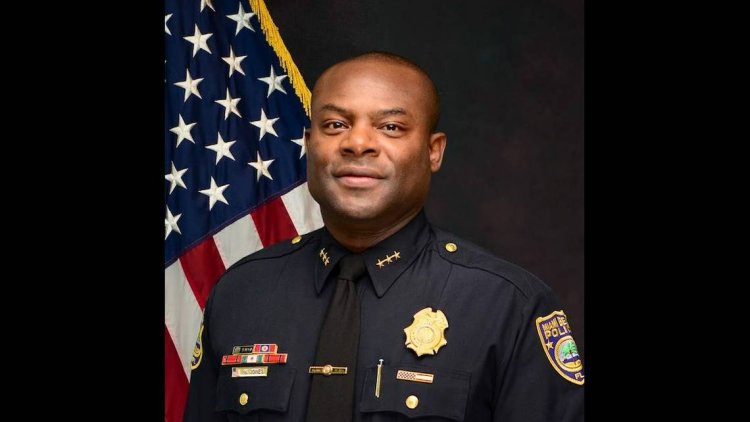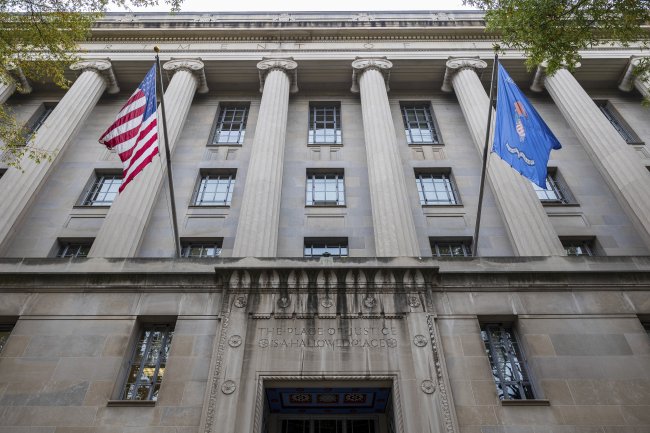‘I have PTSD about it’: New Miami Beach chief discusses past arrest over dispute with wife
City of Miami BeachIncoming Miami Beach Police Chief Wayne Jones spent almost three weeks in jail two decades ago and didn’t return to the department for almost a year, after a domestic incident with his wife in which he was charged with battery and kidnapping.Though the charges were dropped 10 months later after Jones agreed to a pre-trial diversion program, the man expected to be sworn in as the city’s police chief in two weeks said the incident — which involved Jones allegedly entering his estranged wife’s home without permission and at one point grabbing her wrist during a dispute over a spare key — left him emotionally scarred.“I have PTSD about it all the time,” Jones told the Miami Herald in an interview. “Up to that point, I had done everything right not to become a statistic. I never imagined myself, quite frankly, being charged with a crime.”Jones, 54, was a 32-year-old patrol officer at the time.With Chief Richard Clements retiring, Jones, a 27-year veteran of the departmen


Incoming Miami Beach Police Chief Wayne Jones spent almost three weeks in jail two decades ago and didn’t return to the department for almost a year, after a domestic incident with his wife in which he was charged with battery and kidnapping.
Though the charges were dropped 10 months later after Jones agreed to a pre-trial diversion program, the man expected to be sworn in as the city’s police chief in two weeks said the incident — which involved Jones allegedly entering his estranged wife’s home without permission and at one point grabbing her wrist during a dispute over a spare key — left him emotionally scarred.
“I have PTSD about it all the time,” Jones told the Miami Herald in an interview. “Up to that point, I had done everything right not to become a statistic. I never imagined myself, quite frankly, being charged with a crime.”
Jones, 54, was a 32-year-old patrol officer at the time.
With Chief Richard Clements retiring, Jones, a 27-year veteran of the department, will become the first Black chief in the 108-year history of Miami Beach on Sept. 1.
He won the unanimous support of the city’s seven elected officials last month after a recommendation from City Manager Alina Hudak, who said she was aware of Jones’ history.
“The decision to promote Deputy Chief Jones to Chief was taken after a thoughtful review of his personnel file in its entirety, extensive interviews with his colleagues and consideration for the overwhelmingly positive contributions he has made to the Miami Beach Police Department and law enforcement during his 27 years in uniform,” Hudak said in a statement.
Mayor Dan Gelber said Hudak had made him aware of the incident, which didn’t affect his support.
“I have full confidence in Chief Jones,” Gelber said. “He has been promoted multiple times and each time proven his readiness to serve our city.”
Reached by phone, Jones’ ex-wife, Whitney Houston (no relation to the late singer), said that after the dispute and their divorce later in 2001, she and Jones became close friends and remain on good terms. Jones was financially supportive after Houston had a daughter, helping with enrollment at a daycare center, she said.
“Our relationship, even after our divorce, continued to be one that was loving and supportive,” Houston said. “I feel like he’s beyond redeemed himself.”
The 2001 incident, Houston added, was a “one-off kind of thing” that was “out of character for both of us.”
The incident
On June 26, 2001, Jones finished a late-night police shift and realized he had left his keys at home.
Jones asked Houston if he could come to her house in Coconut Grove to retrieve a spare key, according to an internal affairs report reviewed by the Herald. Houston said he could not come over because she was “busy,” Jones told investigators.
Around 1:30 a.m., Jones drove his marked police car to Houston’s home. When she wouldn’t let him past a security gate, Jones jumped over a security fence and climbed to a second-floor balcony, the report says, then opened a sliding glass door to get inside.
Jones found his wife inside with a man she was dating, who proceeded to leave the house, according to the report. During an ensuing argument, Jones allegedly wouldn’t let Houston leave and at one point tried to pull her off a couch while she sat on top of the spare key, causing “minor bruising” to her wrist.
Jones said Houston grabbed a “figurine” during the dispute and that he took it out of her hand, fearing she might hit him with it.
Houston ultimately called the police after driving to a friend’s house, the report says. Miami police responded and didn’t initially arrest Jones, but he was informed later that day that criminal charges would be filed. He turned himself in to Miami police the same day.
Jones was charged with burglary of an occupied home involving battery and kidnapping, two felonies and a misdemeanor, according to the internal affairs report and online court records.
Jones said he was held in jail for about 20 days as the Miami-Dade State Attorney’s Office sought to block his release. He said he was “completely shocked” by the criminal charges and “didn’t feel [he] did anything wrong.” Still, he said, he now regrets how he handled it.
“In retrospect, I wish I had handled that differently,” Jones said. “I regret going to the house that evening.”
Jones said the incident and fallout was “the most difficult and most painful thing I’ve experienced in my entire life.”
He was suspended indefinitely without pay while the charges were pending, returning to work almost a year later when prosecutors dropped the charges. Houston said she didn’t want to pursue the matter, records show, and Jones agreed to complete anger management classes.
An internal affairs investigation continued, concluding in late 2002 that Jones was guilty of “actions which amount to disgraceful conduct while on or off duty.” That led to an additional four-week, unpaid suspension, which Jones served in January 2003.
In an interview Thursday, Jones seemed to contradict parts of a 2002 sworn statement he made to internal affairs investigators after the incident. He denied that Houston had told him not to come over to her house, that he had jumped over a security gate, and that he had grabbed Houston’s wrist while she sat on the couch.
On Friday, after reviewing the internal affairs report, Jones said he may have been “mistaken” about the details.
”It’s something I actually work hard in trying to forget,” he said.
Jones entered into a “last chance agreement” with the city of Miami Beach in December 2002, meaning he was at risk of being fired if he committed other violations. He has not been suspended since, department records show.
Jones had faced two brief suspensions shortly after starting his career in Miami Beach in 1996, of one day and five days, respectively, for failing to attend court appearances in his capacity as an officer.
The 2001 incident made Jones more sensitive toward how police should deal with domestic incidents, he said, something he plans on addressing with police officers through training.
“I’m more empathetic now,” Jones said, adding that it was important “to get more facts and details.”
‘Momentous’ appointment
City Commissioner Ricky Arriola told the Herald he had known about the 2001 incident for years, having heard about it from other people in the police department. He said it doesn’t concern him, calling Jones a “standup guy.”
“I’ve got no concerns whatsoever that he’s going to do a really great job for our community,” Arriola said.
Bobby Hernandez, president of the Miami Beach Fraternal Order of Police, worked as Jones’ boss in the agency’s public information office shortly after his suspension. He called Jones’ arrest “an unfortunate personal matter that he’s moved on from,” saying the chief-in-waiting has had an “exemplary career” since then.
“He’s a great leader. He’s great to work with and he’s great to work for,” Hernandez said. “I’m zero percent concerned about him. I have 100 percent confidence that he will make this place better.”
Hudak announced the appointment of Jones last month after an interview process that was limited to internal candidates. Jones, the department’s second-in-command, was widely viewed as a frontrunner.
Jones had risen from patrol officer to detective, sergeant, lieutenant, captain and major before being sworn in as deputy chief in 2019 on the same day Clements became the department’s top cop.
At the July 26 commission meeting where Jones’ appointment was confirmed, Gelber, the mayor, called it a “momentous moment.”
“I’m very comfortable that it’s the right person at the right time,” he said.
Jones acknowledged the historic nature of his appointment at the meeting, saying that, as a young Black man, he wasn’t comfortable visiting Miami Beach because of racism in the city.
“When I became a Miami Beach police officer, my dad cried,” he said. “He cried because of the history of the way Black people were treated in this city.”
Jones’ appointment comes at a moment of intense focus on crime among Miami Beach residents, particularly in South Beach, even as the city’s crime rate has declined overall. Public safety has been cited as one of the top priorities for several candidates running for mayor in November, when Gelber will be term-limited.
The move also follows years of scrutiny over the police department’s treatment of Black visitors.
In 2021, five Miami Beach officers were arrested for using excessive force on a Black man in handcuffs and for pummeling a Black bystander who was recording the incident. The city also faced criticism for enacting an ordinance that disproportionately targeted Black visitors who made video recordings of police. That law was enacted as part of a series of tough-on-crime measures following an unruly spring break in 2021.
Police and city leaders have continued to grapple with how to keep people safe and manage large crowds of young, mostly Black visitors during spring break in March after a pair of deadly shootings this year on Ocean Drive.
What's Your Reaction?













